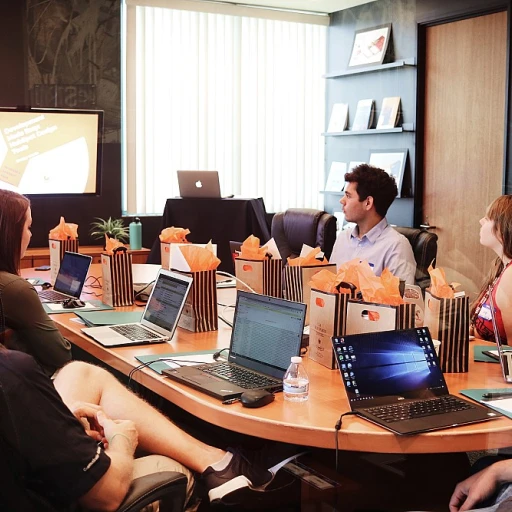-teaser.webp)
Understanding Workplace Solutions
The Essence of Workplace Solutions
Workplace solutions are an essential part of the modern employment landscape, focusing on creating optimized work environments that cater to the needs of both employees and employers. These solutions encompass a wide range of services, from remote work arrangements to real estate management, all aiming to enhance corporate workplace experience and facilitate efficient workforce planning. Understanding the intricacies of workplace solutions requires familiarity with key aspects such as facilities management, job postings, and the benefits of adaptable work environments. Businesses in locations like San Francisco and York are increasingly adopting strategies that prioritize employee satisfaction and productivity. Workplace solutions aren't just about physical spaces. Technology products play a pivotal role in reshaping how management teams operate, offering innovative tools for task execution and communication. This integration of technology is transforming the role of directors and managers, enabling them to oversee diverse teams efficiently, whether on-site or remote. Moreover, workplace solutions address critical issues such as mental health and privacy policy adherence, ensuring a supportive atmosphere for all employees. With the right strategies, organizations can streamline their corporate workplace services, leading to improved job satisfaction and business development. Understanding these dynamics is crucial for anyone looking to explore careers in workplace solutions, be it as a site solutions manager or a business partner. To dive deeper into the potential of such a career, you might want to explore the guide to successfully launch a temporary staffing agency as a related resource.Key Skills for Success
Developing Core Competencies for Professionals in Workplace Solutions
For individuals looking to make a mark in workplace solutions, mastering key skills is crucial. From York to San Francisco, thriving in this evolving field requires developing a blend of competencies that facilitate effective management and strategic planning.- Communication and Team Management: Professionals in this arena, like directors or managers, must excel in clear communication to foster productive environments. Establishing robust business partner relationships and overseeing corporate workplace operations are part of the duties.
- Problem-Solving and Adaptability: Whether handling remote job challenges or onsite site solutions, the ability to navigate workplace complexities is essential. This includes managing early facilities services efficiently.
- Technological Proficiency: Embracing technology is a non-negotiable aspect, as technology products and workplace solutions continue to evolve. Staying abreast of innovations helps professionals enhance the workplace experience and customer service.
- Analytical Skills: Effective workforce planning requires data-driven insights. Understanding real estate workplace metrics and implementing business development strategies contribute to growth.
- Cultural Awareness and DEI (Diversity, Equity, and Inclusion): With a global talent community and the emphasis on inclusivity, fostering a respectful environment is paramount for professionals at all levels, from vice president to entry-level positions.
- Emotional Intelligence: Recognizing and managing emotions, both personally and in teams, is vital. Addressing mental health concerns and establishing a supportive culture leads to improved overall workplace solutions.
The Role of Technology
The Impact of Technology on Workforce Solutions
In the evolving landscape of workplace solutions, technology plays a pivotal role in shaping how businesses operate and manage their teams. From New York to San Francisco, companies are increasingly leveraging technology to enhance workplace experiences and streamline operations. This shift is evident across various sectors, including real estate, corporate workplace management, and remote work solutions.
One of the primary benefits of integrating technology into workforce planning is the ability to improve efficiency and productivity. Tools like site solutions and technology products enable managers and directors to oversee operations more effectively, whether they're dealing with facilities management or customer service. Moreover, technology facilitates better communication and collaboration among team members, which is crucial in a remote work environment.
For those in management roles, such as a vice president or business partner, technology offers the advantage of data-driven decision-making. By analyzing data from various sources, leaders can make informed decisions about hiring, talent management, and business development. This data-centric approach not only aids in identifying the right applicants for job postings but also helps in crafting strategies that align with the company's long-term goals.
However, the integration of technology is not without its challenges. Issues related to privacy policy and cookie policy must be carefully managed to ensure compliance and protect employee data. Additionally, as technology continues to evolve, there is a growing need for ongoing training and development to keep the workforce adept at using new tools and platforms.
Ultimately, the role of technology in workforce solutions is to create a more adaptable and resilient business environment. By embracing technological advancements, companies can not only enhance their operational efficiency but also improve the well-being of their employees. For more insights on how technology can enhance the well-being of workers, particularly in the BPO sector, you can explore this resource.
Challenges in Workforce Planning
Diving into the Complexities
Workforce planning, particularly when focusing on workplace solutions, presents an array of challenges that businesses need to navigate. This field, which spans industries from real estate workplace management to corporate solutions, often demands a comprehensive approach beyond just general management.- Remote Work Dominance: With the rise in remote job opportunities, businesses have had to rethink their strategy. Establishing effective remote management practices, for example, demands new solutions in privacy policy adherence, enhanced team communication, and facilitation of services.
- Mental Health Prioritization: Another emergent challenge is ensuring mental health benefits are integrated into workplace experience designs. This isn't just an HR issue but crucial across roles from directors to team leads, enhancing hiring practices and employee retention.
- Technology and Facilities: While technology products can improve job efficiency, they also introduce complexities in terms of implementation and user experience. Facilities management must ensure these solutions align with practical business requirements and support site solutions.
- Skilled Talent Acquisition: Identifying and attracting skilled applicants remains a priority. The need to join talent who can manage evolving workplace solutions in cities like New York or San Francisco can dictate the direction of business development projects and sales strategies.
- Regulatory Compliance: Navigating regulations, such as those governing estate workplaces, adds an additional layer of complexity. Ensuring compliance while optimizing corporate workplace environments is a careful balancing act.
- Cultural Shifts: Cultural changes within the United States, like the increasing focus on diversity and inclusion, push workplace solutions providers to continuously evolve.
Career Pathways and Opportunities
Career Growth Opportunities in Workplace Solutions
Exploring career paths in the realm of workplace solutions can be both exciting and rewarding. As businesses across the United States continue to evolve, professionals with expertise in planning and optimizing work environments are in high demand. York and San Francisco are among the cities offering diverse roles in this sector. Professionals often start their journey in entry-level positions which allow them to gain essential experience. Early roles might include facilities services coordinator or workplace experience associate. As you hone these foundational skills, opportunities to advance will become available.- Mid-Level Roles: Moving up the ladder, professionals can pursue titles such as workplace solutions manager. In this role, a strong understanding of project management and customer service is crucial, as you will oversee teams responsible for site solutions and remote job implementations.
- Senior-Level Roles: Experienced professionals may advance to higher-level positions such as director or vice president of corporate workplace solutions. Here, strategic planning, business development, and a comprehensive understanding of privacy policy within real estate management are required.
Future Trends in Workplace Solutions
Emerging Trends Shaping the Future of Workplace Solutions
The landscape of workplace solutions is continually evolving, driven by technological advancements and changing business needs. Organizations across the united states and beyond are seeking innovative ways to optimize their real estate workplace while meeting the expectations of a modern workforce.- Emphasis on Remote Work: As remote job opportunities become more prevalent, businesses are increasingly investing in solutions that foster seamless collaboration and communication across geographically dispersed teams. Technologies enabling virtual meetings and remote office management are becoming indispensable.
- Mental Health and Well-Being: There is a growing recognition of the importance of mental health services within the corporate workplace. Companies are adopting solutions aimed at promoting employee well-being, understanding that a healthy workforce is crucial for productivity and employee retention.
- Sustainable and Smart Facilities: Eco-friendly practices and the adoption of smart technology product solutions are becoming prominent as organizations strive to reduce their carbon footprint. Energy-efficient buildings and smart facility management systems enhance the workplace experience while offering significant cost savings.
- Data-Driven Decision Making: With advances in technology, organizations now harness data analytics for informed decision-making in workforce planning and management. Real-time data helps in assessing workplace solutions effectiveness and improving resource allocation.
- The Rise of Hybrid Roles: New jobs are emerging where traditional roles merge with technology, requiring employees to possess a diverse skill set. Leaders like directors and managers need to adapt to overseeing both technology-driven projects and human-centric initiatives.














